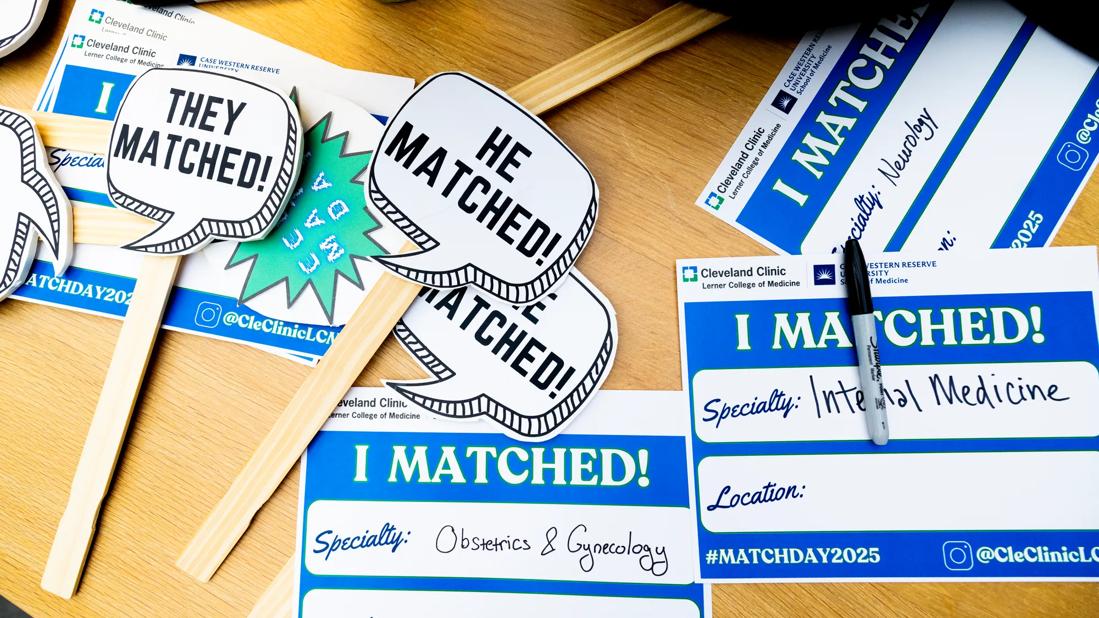Survey explores trainees’ exposure to and perceptions of the specialty

Image content: This image is available to view online.
View image online (https://assets.clevelandclinic.org/transform/a0121ad3-613c-45c3-9f70-fffc74012032/EDU_5516371_03-21-25_008_LDJ)
Match Day signs
When Cleveland Clinic nephrologist Georges Nakhoul, MD, MEd, began his medical training in 2013, he chose to specialize in nephrology because it was intellectually challenging, offered a good quality of life and allowed him to work with patients he enjoyed. Unfortunately, many current internal medicine trainees don’t feel the same way.
Advertisement
Cleveland Clinic is a non-profit academic medical center. Advertising on our site helps support our mission. We do not endorse non-Cleveland Clinic products or services. Policy
The number of nephrology applicants has been declining over the last decade or so, says Dr. Nakhoul. In 2019, 58.6% of nephrology programs and 38% of nephrology positions were unfilled.
“This is a big concern,” he says. “Nephrology needs a pipeline of candidates to provide care for the growing number of patients with chronic kidney disease and end-stage kidney disease.”
That’s what led Dr. Nakhoul to spearhead an effort to learn why trainees aren’t choosing to specialize in nephrology. Results were shared in two ePoster presentations at the American Society of Nephrology’s Kidney Week 2020.
To help design a 60-question survey, Dr. Nakhoul’s team first did a qualitative study, interviewing 10 residents about their experience with and exposure to nephrology.
“One theme that stood out, which we weren’t expecting, was that some students who hadn’t chosen to specialize in nephrology hadn’t really been exposed to it,” says Dr. Nakhoul.
To explore this topic further, the researchers surveyed 415 trainees in eight internal medicine residency programs in the U.S. Of the 184 respondents, only 33.5% had rotated in nephrology during their clinical years — years three and four — of medical school. Although 75% said they rotated in nephrology during their residency, it was too little too late.
“This is troublesome because 30-40% of trainees choose their specialty in the third and fourth years of med school, when there is a gap in exposure to nephrology,” says Dr. Nakhoul.
Moreover, residents rated the quality of nephrology education during their clinical years of med school a median of only 50 on a 100-point scale. Nephrology education during the first two years of med school and during residency was rated higher, a median of 65 and 74 relatively.
Advertisement
“Maybe in some schools nephrology isn’t part of the core curriculum and is treated as an elective,” suggests Dr. Nakhoul. “There is a big opportunity for nephrologists to get more involved in the mentoring of students, taking them on rotations and providing more exposure to our specialty.”
Dr. Nakhoul’s team also presented a second poster on residents’ perception of the nephrology specialty.
Survey respondents said that some major factors they consider when choosing a specialty are the intellectual challenge, work-life balance and the ability to make a difference in patients’ lives. Nephrology was highly regarded in those categories.
“If those are the most important factors, then why aren’t more trainees choosing nephrology?” asks Dr. Nakhoul. “Maybe our specialty’s perceived negatives outweigh the positives.”
Among those negatives were:
Advertisement
These survey results pose some real considerations for the nephrology specialty, says Dr. Nakhoul. Some may require a broad national effort, such as rethinking RVUs and how nephrologists are reimbursed. Additionally, introducing nephrology subspecialties (such as interventional nephrology) may make the field more attractive to trainees who don’t prefer providing a wide spectrum of care.
“Every nephrologist can seek to be more engaged in medical education,” he concludes. “Students need role models. Just by being present during training, we can have more influence on their specialty decisions.”
Advertisement
Advertisement
Pediatric urologists lead quality improvement initiative, author systemwide guideline
Fixed-dose single-pill combinations and future therapies
Reproductive urologists publish a contemporary review to guide practice
Two recent cases show favorable pain and cosmesis outcomes
Meta-analysis assesses outcomes in adolescent age vs. mid-adulthood
Proteinuria reduction remains the most important treatment target.
IgA nephropathy is a relatively common autoimmune glomerular disease that can be diagnosed only by biopsy
Oncologic and functional outcomes are promising, but selection is key